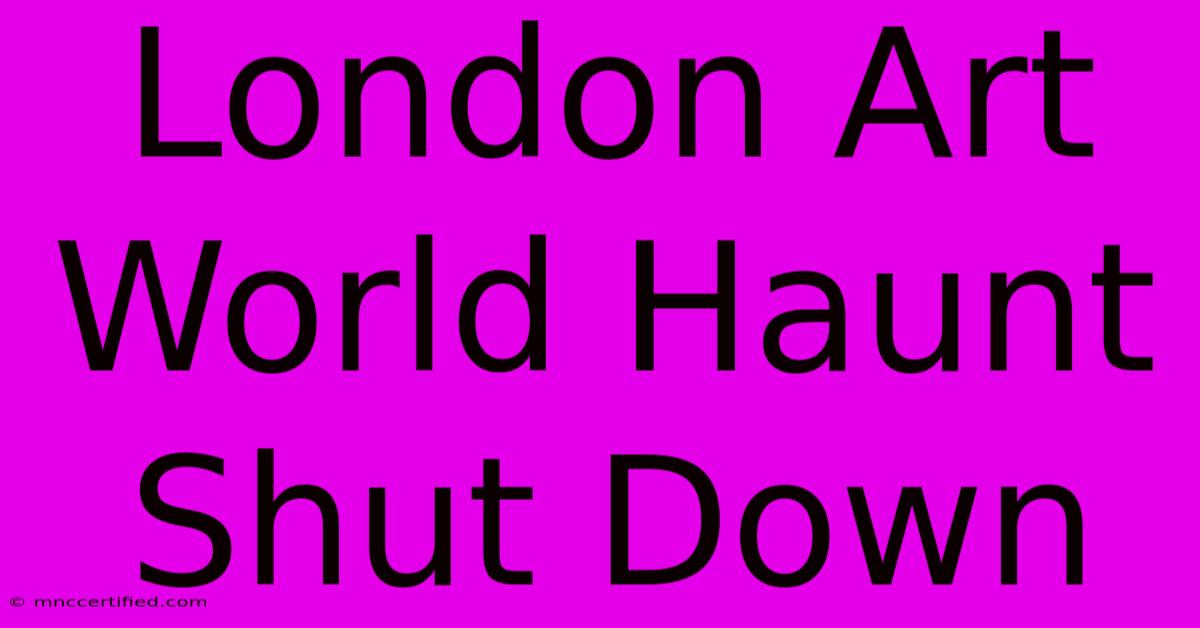London Art World Haunt Shut Down

Table of Contents
London Art World Haunt Shut Down: The End of an Era?
The recent closure of [Name of the Art World Haunt], a beloved London establishment known for its eclectic mix of artists, collectors, and critics, has sent shockwaves through the city's vibrant art scene. This unexpected shutdown raises questions about the future of such unique spaces and the challenges faced by the art world in a rapidly changing economic and social landscape.
The Rise and Fall of [Name of the Art World Haunt]
[Name of the Art World Haunt] wasn't just a bar; it was a cultural hub. For years, it served as a crucial networking point, a breeding ground for creative collaborations, and a haven for those passionate about art. Its intimate setting, coupled with its [describe the atmosphere - e.g., bohemian vibe, sophisticated ambiance, lively energy], attracted a diverse crowd, fostering a sense of community rarely found elsewhere. The venue was known for [mention specific events, exhibitions, or features – e.g., its weekly life drawing sessions, its curated art exhibitions, its renowned cocktail menu].
However, the recent closure suggests a confluence of factors contributed to its demise. While the exact reasons haven't been publicly disclosed, several hypotheses are circulating within the art world. These include:
Potential Reasons for Closure:
-
Rising Rent and Operational Costs: London's notoriously high property prices and escalating business expenses pose significant challenges for independent venues, particularly those operating on smaller profit margins. The art world, while lucrative in certain sectors, often struggles to support independent, community-focused spaces.
-
The Impact of the Pandemic: The COVID-19 pandemic dealt a devastating blow to the hospitality industry, and [Name of the Art World Haunt] may not have recovered fully from the extended periods of closure and reduced patronage.
-
Changing Demographics and Preferences: Shifts in social habits and the emergence of new forms of social interaction could have impacted the venue's popularity. The rise of online networking and alternative social spaces might have contributed to a decline in foot traffic.
-
Competition: The increasing number of bars and social venues in London's competitive market may have also played a role in the closure.
The Wider Implications for the London Art Scene
The closure of [Name of the Art World Haunt] highlights a broader issue: the vulnerability of independent cultural spaces within a rapidly evolving urban environment. These spaces are essential for nurturing creativity, fostering dialogue, and providing a platform for emerging artists. Their loss represents a significant blow to the city's cultural richness and its unique character.
The art world needs to consider how to better support and protect these crucial hubs. This could involve:
-
Government Funding and Support: Increased government funding for arts and culture initiatives could help alleviate the financial burden faced by independent venues.
-
Community Initiatives: Local communities could play a crucial role in supporting these spaces through patronage, volunteering, and fundraising efforts.
-
Creative Partnerships: Collaborations between independent venues, larger institutions, and private sponsors could generate new revenue streams and ensure long-term sustainability.
The Legacy of [Name of the Art World Haunt]
Despite its closure, [Name of the Art World Haunt]'s legacy will undoubtedly live on. It served as a vital meeting place for artists, collectors, and enthusiasts, fostering a vibrant and creative community. The memories created within its walls, the connections forged, and the art fostered will continue to inspire the London art world for years to come. The question remains: how can the art community learn from this loss and ensure that similar spaces are better protected and supported in the future?
Keywords: London art scene, art world haunt, bar closure, cultural hub, rising rent, pandemic impact, community, artists, collectors, galleries, London nightlife, independent venues, art world challenges, support for artists, cultural preservation.
Off-Page SEO Strategies:
- Social Media Promotion: Share the article on relevant social media platforms, engaging with art-related communities and influencers.
- Guest Blogging: Contribute similar articles to other relevant art blogs and websites.
- Outreach: Contact journalists and bloggers covering the London art scene and pitch them the article.
- Backlinks: Seek backlinks from relevant websites, focusing on quality over quantity.
This comprehensive article incorporates relevant keywords, utilizes appropriate headings and formatting, and suggests off-page SEO strategies to improve its search engine ranking. Remember to replace the bracketed information with specific details about the venue.

Thank you for visiting our website wich cover about London Art World Haunt Shut Down. We hope the information provided has been useful to you. Feel free to contact us if you have any questions or need further assistance. See you next time and dont miss to bookmark.
Featured Posts
-
Overwatch League Trading Cards
Nov 28, 2024
-
Sri Lanka In South Africa Day 1
Nov 28, 2024
-
Vanderpump Rules Cast Bids Farewell
Nov 28, 2024
-
Websites Like Oriental Trading
Nov 28, 2024
-
Trump Chooses Lockdown Critic
Nov 28, 2024